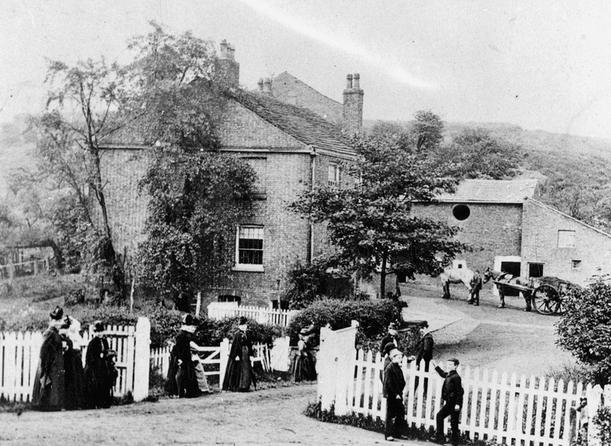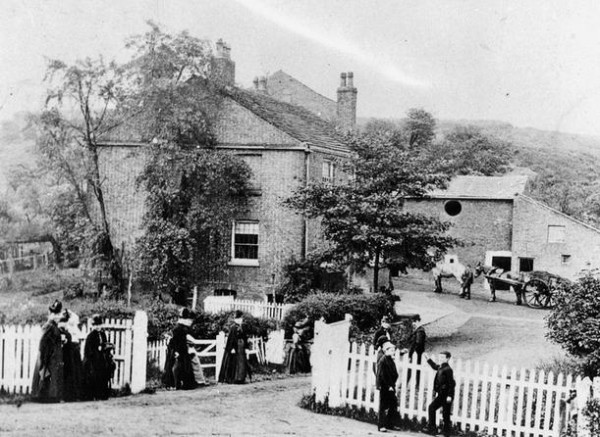Editor’s Note: This story presents many problems as it arrived in Roby’s book by an extremely tortuous route. Note above Kay’s Farmhouse to which the legend may have become attached.
Not far from the little snug smoky village of Blackley, there lies one of the most romantic of dells, rejoicing in a state of singular seclusion, and in the oddest of Lancashire names, to wit, the ‘Boggart-hole.’ Rich in every requisite for picturesque beauty and poetical association, it is impossible for me (who am neither a painter nor a poet) to describe this dell as it should be described; and I will therefore only beg of thee, gentle reader, who peradventure mayst not have lingered in this classical neighbourhood, to fancy a deep, deep dell, its steep sides fringed down with hazel and beech, and fern and thick undergrowth, and clothed at the bottom with the richest and greenest sward in the world. You descend, clinging to the trees, and scrambling as best you may, and now you stand on haunted ground! Tread softly, for this is the Boggart’s clough; and see in yonder dark corner, and beneath the projecting mossy stone, where that dusky sullen cave yawns before us, like a bit of Salvator’s best, there lurks the strange elf, the sly and mischievous Boggart. Bounce! I see him coming; oh no, it was only a hare bounding from her form; there it goes there!
I will tell you of some of the pranks of this very Boggart, and how he teased and tormented a good farmer’s family in a house hard by, and I assure you it was a very worthy old lady who told me the story. But first, suppose we leave the Boggart’s demesne, and pay a visit to the theatre of his strange doings.
You see that old farm-house about two fields distant, shaded by the sycamore-tree: that was the spot which the Boggart or Bar-gaist selected for his freaks; there he held his revels, perplexing honest George Cheetham for that was the farmer’s name scaring his maids, worrying his men, and frightening the poor children out of their seven senses, so that at last not even a mouse durst show himself indoors at the farm, as he valued his whiskers, five minutes after the clock had struck twelve.
It had long been remarked that whenever a merry tale was told on a winter’s evening a small shrill voice was heard above all the rest, like a baby’s penny trumpet, joining in with the laughter.
‘Weel laughed, Boggart, thou’rt a fine little tyke, I’se warrant, if one could but just catch glent on thee,’ said Robert, the youngest of the farmer’s sons, early one evening, a little before Christmas, for familiarity had made them somewhat bold with their invisible guest. Now, though more pleasant stories were told on that night beside the hearth than had been told there for the three preceding months, though the fire flickered brightly, though all the faces around it were full of mirth and happiness, and though everything, it might seem, was there which could make even a Boggart enjoy himself, yet the small shrill laugh was heard no more that night after little Bob’s remark.
Robert, who was a short stout fellow for his age, slept in the same bed with his elder brother John, who was reckoned an uncommonly fine and tall lad for his years. No sooner had they got fairly to sleep than they were roused by the small shrill voice in their room shouting out, ‘Little tyke, indeed! Little tyke thysel’. Ho, ho, ho! I’ll have my laugh now. Ho, ho, ho!’
The room was completely dark, and all in and about the house was so still that the sound scared them fearfully. The concluding screech made the place echo again; but this strange laughter was not necessary to prevent little Robert from further sleep, as he found himself one moment seized by the feet and pulled to the bottom of the bed, and the next moment dragged up again on his pillow. This was no sooner done, than by the same invisible power he was pulled down again, and then his head would be dragged back, and placed as high as his brother’s. ‘Short and long won’t match, short and long won’t match, ho, ho, ho !’ shouted the well-known voice of the Boggart, between each adjustment of little Robert with his tall brother, and thus were they both wearied for more than a hundred times; yet so great was their terror, that neither Robert nor his brother ‘Long John,’ as he ever afterwards was called dared to stir one inch; and you may well suppose how delighted they both were when the first grey light of the morning appeared. ‘We’st now ha’ some rest, happen’ said John, turning on his side in the expectation of a good nap, and covering himself up with the bed-clothes, which the pulling of Robert so often backwards and forwards had tumbled about sadly.
‘Rest!’ said the same voice that had plagued them through the night, ‘rest! what is rest? Boggart knows no rest.’ ‘Plague tak’ thee for a Boggart!’ said the farmer next morning, on hearing the strange story from his children: ‘Plague tak’ thee! Can thee not let the poor things be quiet? But I’ll be up with thee, my gentleman: so tak’ th’ chamber an’ be hang’d to thee, if thou wilt. Jack and little Robert shall sleep o’er the cart-house, and Boggart may rest or wriggle as he likes when he is by himself’.
The move was accordingly made, and the bed of the brothers transferred to their new sleeping-room over the cart-house, where they remained for some time undisturbed; but his Boggartship having now fairly become the possessor of a room at the farm, it would appear, considered himself in the light of a privileged inmate, and not, as hitherto, an occasional visitor, who merely joined in the general expression of merriment. Familiarity, they say, breeds contempt; and now the children’s bread and butter would be snatched away, or their porringers of bread and milk would be dashed to the ground by an unseen hand; or if the younger ones were left alone but for a few minutes, they were sure to be found screaming with terror on the return of their nurse. Sometimes, however, he would behave himself kindly. The cream was then churned, and the pans and kettles scoured without hands. There was one circumstance which was remarkable; the stairs ascended from the kitchen, a partition of boards covered the ends of the steps, and formed a closet beneath the staircase. From one of the boards of this partition a large round knot was accidentally displaced; and one day the youngest of the children, while playing with the shoe-horn, stuck it into this knot-hole. Whether or not the aperture had been formed by the Boggart as a peep-hole to watch the motions of the family, I cannot pretend to say. Some thought it was, for it was called the Boggart’s peep-hole; but others said that they had remembered it long before the shrill laugh of the Boggart was heard in the house. However this may have been, it is certain that the horn was ejected with surprising precision at the head of whoever put it there; and either in mirth or in anger the horn was darted forth with great velocity, and struck the poor child over the ear.
There are few matters upon which parents feel more acutely than that of the maltreatment of their offspring; but time, that great soother of all things, at length familiarised this dangerous occurrence to every one at the farm, and that which at the first was regarded with the utmost terror, became a kind of amuse ment with the more thoughtless and daring of the family. Often was the horn slipped slyly into the hole, and in return it never failed to be flung at the head of some one, but most commonly at the person who placed it there. They were used to call this pastime, in the provincial dialect, ‘laking wi’ t’ Boggart;’ that is, playing with the Boggart. An old tailor, whom I but faintly remember, used to say that the horn was often ‘pitched’ at his head, and at the head of his apprentice, whilst seated here on the kitchen table, when they went their rounds to work, as is customary with country tailors. At length the goblin, not contented with flinging the horn, returned to his night persecutions. Heavy steps, as of a person in wooden clogs, were at first heard clattering down-stairs in the dead hour of darkness; then the pewter and earthern dishes appeared to be dashed on the kitchen-floor; though in the morning all remained uninjured on their respective shelves. The children generally were marked out as objects of dislike by their unearthly tormentor. The curtains of their beds would be violently pulled to and fro, then a heavy weight, as of a human being, would press them nearly to suffocation, from which it was impossible to escape. The night, instead of being the time for repose, was disturbed with screams and dreadful noises, and thus was the whole house alarmed night after night. Things could not long continue in this fashion; the farmer and his good dame resolved to leave a place where they could no longer expect rest or comfort: and George Cheetham was actually following with his wife and family the last load of furniture, when they were met by a neighbouring farmer, named John Marshall.
‘Well, Georgey, and soa you’re leaving th’ owd house at last?’ said Marshall. ‘Heigh, Johnny, ma lad, I; m in a manner forced to ’t, thou sees,’ replied the other; ‘for that wearyfu’ Boggart torments us soa, we can neither rest neet nor day for’t. It seems loike to have a malice again’t young ans, an’ it ommost kills my poor dame here at thoughts on’t, and soa thou sees we’re forc’d to flitt like.’
He had got thus far in his complaint, when, behold, a shrill voice from a deep upright churn, the topmost utensil on the cart, called out ‘Ay, ay, neighbour, we’re flitting, you see.’ ‘Od rot thee!’ exclaimed George: ‘if I’d known thou’d been flitting too I wadn’t ha’ stirred a peg. Nay, nay, it’s to no use, Mally,’ he continued, turning to his wife, ‘we may as weel turn back again to th’ owd house as be tormented in another not so convenient.’
They did return; but the Boggart, having from the occurrence ascertained the insecurity of his tenure, became less outrageous, and was never more guilty of disturbing, in any extraordinary degree, the quiet of the family (Roby 1872, I, 375-384)


